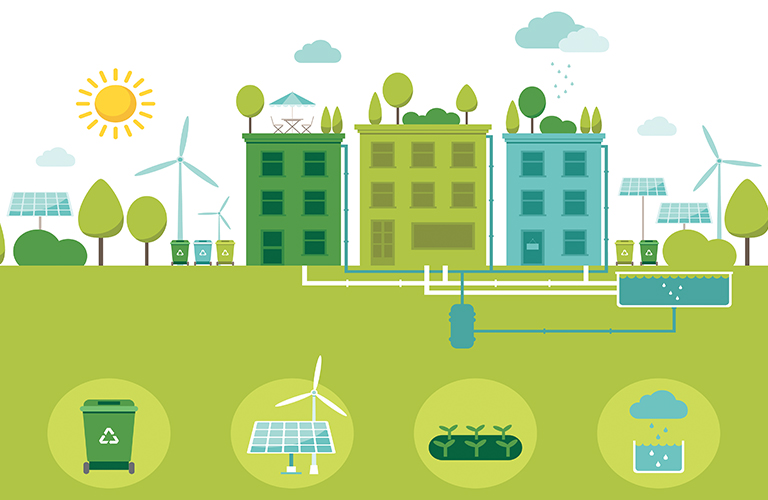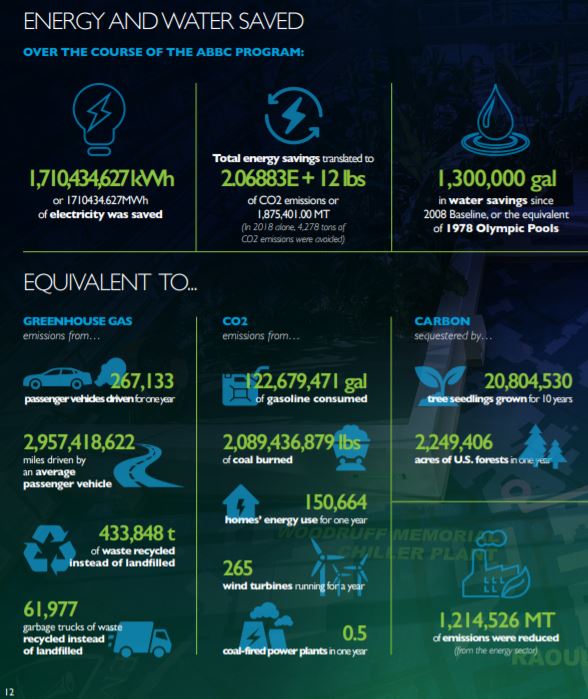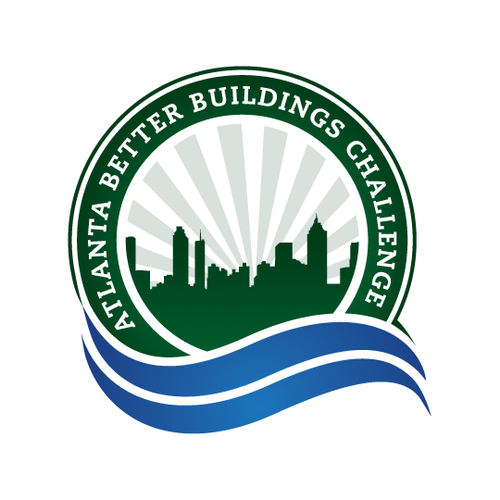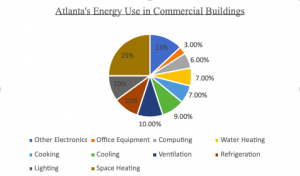What is the Challenge?
In 2011, President Barack Obama challenged cities to the Better Building Initiative which was to make commercial buildings efficient in energy and water by 20% more by 2020.
Atlanta Better Building Challenge (ABBC) has the most amount of square footage participating in this challenge of over 11 million. The focus for Atlanta is wanting to ensure businesses can save $40 billion annually on energy costs which will allow them to put those funds into creating more jobs and flourishing in different aspects.
Commercial Building Consumption
Commercial buildings are used for commercial purposes like offices, retail, or warehouses. Papineau (2017) stated that commercial buildings guzzle 40 percent of electricity and 20 percent of all energy in the United States. In order to make these buildings more energy-efficient, a variety of improvements and clean energy approaches must be taken on so that Atlanta can create more jobs and build a stronger economy.
When commercial buildings are unused they create brownfields. The New Bedford Resilience Office has a Brownfield Project where they are attempting to make better the fields of these sites. When interviewing a representative of the New Bedford Office of Resilience they stated that brownfields are “any property that is underutilized or vacant and the reviews of the site are impeded by potential contamination. People don’t always know if it is contaminated and may be afraid to look or they know it is contaminated and then it needs to be remediated. Soil remediation occurs as well, excavating and putting some kind of treatment system in, as well as groundwater remediation with gas stations and leaking tanks” (Personal Interview, 03/25/2021).
The overall goal of the better building initiative is to improve the efficiency of buildings across the country. Better buildings save money by saving energy, creating more sustainable communities, and helping to protect future generations from the impacts of climate change. Such as the Brownfields projects, which is when a city utilizes a building that presents potentially hazardous substances, pollutants, and contaminants by reducing emissions and upgrading the commercial/industrial land. These programs can include improvements within water savings and successful partnerships that cut costs and pollution. The Brownfield projects and Atlanta’s Better Building challenge are both important because they protect the environment and provide troubled abandoned spaces with new technological systems and developments that help to combat climate change.

Atlanta’s Results
Atlanta was able to reduce energy and water consumption in its buildings by 20.3% ahead of schedule in 2018.
- 1,710,434,627kWh of electricity saved.
- 2.06883E + 12lbs of total energy saved.
- 1,300,000 gallons of water saved.

Community Well-Being Benefits
Atlanta reaching this goal for reducing commercial building energy and water use enabled the improvement in air quality. By efficiently using their resources these building that participated in this challenge was able to decrease and avoid many harmful gases that applied to the air pollution in the world.
The gases not placed in the atmosphere include:
- 722,709 metric tons of CO2
- 31,000 pounds of Nitrogen Oxides
- 75,400 fewer pounds of sulfur dioxide in the air
Conclusion
Atlanta Better Building Challenge was able to achieve its goals which allowed for positive consequences of increasing the wellbeing of the surrounding communities. This challenge created for an environment in Atlanta to be increasingly better as well as enabled many from inhaling toxic gases. This program showcases that if communities work together there will be able to be change in Atlanta. We see that buildings were able to mitigate their water and energy use by having the initiative to do so. The next step this for the Atlanta Better Building Challenge is to focus on residential buildings. This is due to the fact that just as we can see how commercial buildings are able to reduce environmental changes in this arena so will residential buildings if they are directed in the right ways.

